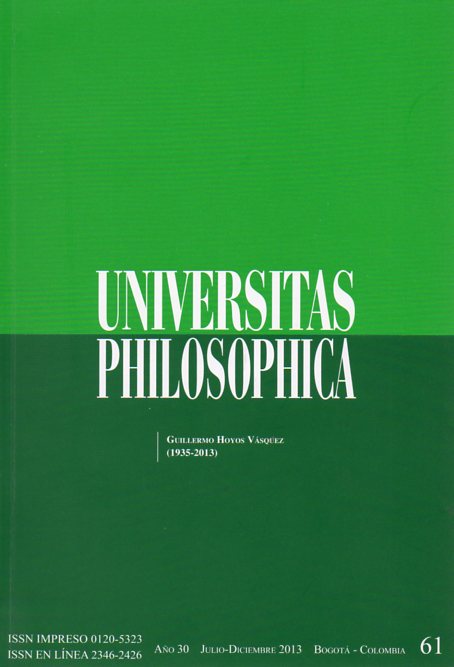Resumen
Contra aquellas lecturas formalistas de la filosofía práctica deKant, se asume una lectura de su propuesta ética a partir delconcepto de máxima. Al referirnos a la moral kantiana comouna moral de máximas, se postula un modelo específico dela acción racional, el cual posibilita la aplicación de la leymoral. La máxima, dentro de este modelo de acción, sirvecomo principio práctico subjetivo de la acción a partir delcual se aplica el imperativo categórico, como su principiopráctico objetivo. Esto implica que la propuesta de Kant noexcluye el contexto práctico en el que se quiere realizar laacción, así como tampoco la situación específica del agenteque la pretende realizar.Esta revista científica se encuentra registrada bajo la licencia Creative Commons Reconocimiento 4.0 Internacional. Por lo tanto, esta obra se puede reproducir, distribuir y comunicar públicamente en formato digital, siempre que se reconozca el nombre de los autores y a la Pontificia Universidad Javeriana. Se permite citar, adaptar, transformar, autoarchivar, republicar y crear a partir del material, para cualquier finalidad (incluso comercial), siempre que se reconozca adecuadamente la autoría, se proporcione un enlace a la obra original y se indique si se han realizado cambios. La Pontificia Universidad Javeriana no retiene los derechos sobre las obras publicadas y los contenidos son responsabilidad exclusiva de los autores, quienes conservan sus derechos morales, intelectuales, de privacidad y publicidad.
El aval sobre la intervención de la obra (revisión, corrección de estilo, traducción, diagramación) y su posterior divulgación se otorga mediante una licencia de uso y no a través de una cesión de derechos, lo que representa que la revista y la Pontificia Universidad Javeriana se eximen de cualquier responsabilidad que se pueda derivar de una mala práctica ética por parte de los autores. En consecuencia de la protección brindada por la licencia de uso, la revista no se encuentra en la obligación de publicar retractaciones o modificar la información ya publicada, a no ser que la errata surja del proceso de gestión editorial. La publicación de contenidos en esta revista no representa regalías para los contribuyentes.


